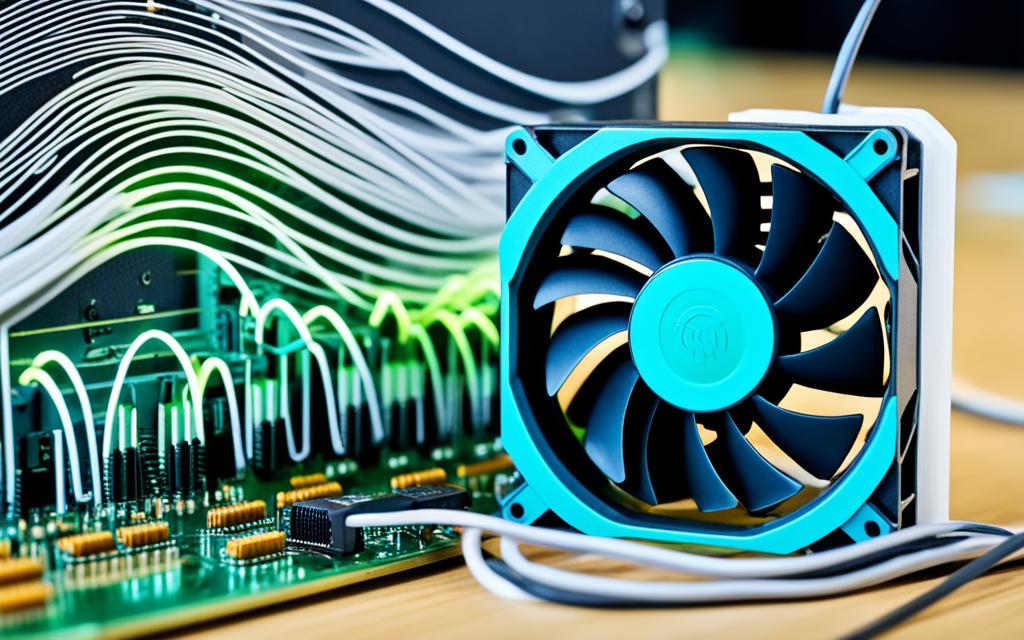Table of Contents
If the hum of a noisy CPU fan bothers you, you’re not alone. Knowing how to make your CPU fan quieter is key. This is because the fan’s job is to keep your computer cool. But, if your CPU fan is too loud, it’s a sign something’s wrong. It can distract you and harm your computer. This article will show you how to lessen fan noise for a quieter, more efficient system. For deeper insights, have a look at this article on loud PCs1.
Key Takeaways
- High internal temperatures can contribute to increased fan noise.
- Regular cleaning of dust filters and heatsinks prevents noise escalation.
- Monitoring CPU and memory usage can identify processes that cause excess fan activity.
- Upgrading to efficient cooling solutions, like quiet fans or SSDs, can significantly lower noise levels.li>
- Proper airflow and ventilation are essential for optimal performance and reduced noise.
Understanding the Causes of Noisy CPU Fans
Noisy CPU fans can annoy anyone using a computer. They often highlight problems that need fixing. Understanding the causes of noisy CPU fans helps in fixing the noise. Thus, it leads to a quieter computing environment.
High Internal Temperatures
High internal temperatures are a main reason for noisy fans. As components get hotter, they make fans spin faster to keep cool. This can make the fan louder, especially when the computer is doing heavy tasks like gaming or video editing2.
It’s key to watch the CPU’s heat and make sure it stays cool to lessen noise. Using good cooling solutions helps with this.
Dust Buildup and Poor Ventilation
Dust buildup is another big reason for loud CPU fans. Dust stops good airflow, making cooling fans noisier because they have to work more2.
Cleaning the computer often and keeping it in a space where air can move freely can help a lot. This tackles both dust and airflow problems3.
Software Overload and Malware
Software overload also makes fans louder. Having many programs open or doing tasks like rendering puts a lot of pressure on the CPU. This makes the fans go at full speed. Malware, too, can use up a lot of CPU power, making things worse4. Solving these software issues is key to a quieter PC. For more tips, check out this page.
How to Quiet CPU Fan: Simple Maintenance Techniques
Keeping your CPU fan quiet is all about routine care and smart techniques. With the right upkeep, your computer can run both smoothly and silently.
Regular Cleaning and Dust Removal
Dust can block airflow and make your fan noisier as it works harder. Regularly blowing dust away with compressed air helps keep things cool. Studies confirm that good PC upkeep cuts down on fan noise and boosts efficiency5. Cleaning not only reduces sound but also extends the life of your parts. A fan can last up to 50,000 hours5.
Effective Ventilation Strategies
Easing overheating is crucial. It involves setting up your computer on solid surfaces for better airflow. Laptop cooling pads are a smart idea for tight spaces. Poor ventilation can make temperatures soar and fans loud5. Avast Cleanup software may help control the CPU load, reducing fan noise6.
| Maintenance Task | Benefits |
|---|---|
| Regular Dust Cleaning | Reduces noise and prevents overheating |
| Optimising Airflow | Maintains hardware performance and longevity |
| Using Cooling Pads | Improves airflow in compact setups |
Utilising Task Manager to Identify Resource Hogs
Nowadays, keeping your computer running smoothly is key for a nice user experience. Task Manager is crucial for monitoring and managing your system. It helps find and fix issues caused by apps that use too many resources.
How to Close Background Applications
To close background processes that slow down your system, start Task Manager with Ctrl + Shift + Esc. Look under the ‘Processes’ tab to see all active applications. Watch out for those using a lot of CPU or memory. Right-click on them and choose ‘End Task’ to fix the problem. Doing this regularly helps you manage CPU usage and keeps your PC quick.
Monitoring CPU and Memory Usage
It’s important to frequently check how apps affect your PC’s performance. The ‘Performance’ tab in Task Manager shows CPU and memory use in real-time. Keep CPU use under 20% when the system is idle. If it’s higher, close some applications to improve performance and stop your PC from overheating. This will also make your hardware last longer.
| CPU Load Condition | Temperature (°C) | Fan Speed (RPM) |
|---|---|---|
| Idle | 28 – 33 | 650 – 850 |
| Full Load | 69 – 72 | 1800 – 2000 |
For tips on improving CPU performance, visit this guide on lowering CPU usage. It explains how to keep your system running smoothly.
Also, make sure your cooling systems, such as the CPU fan, are clean and work well. This helps your computer last longer. For advice on cleaning PC fans, see this article on cleaning PC fans78.
Setting Up Fan Controls for Optimal Performance
Getting your PC’s fans to work right lets you balance sound and speed. By tuning your BIOS settings and using good fan management software, your computer can run quietly. We’ll show you how to adjust your fans to suit your needs.
Accessing the BIOS and Adjusting Settings
First, go into the BIOS to control your fan settings. There, you can make a fan curve that’s just right for noise and speed. A lot of the time, the default setting makes too much noise. A smooth increase in fan speed, based on how hot your computer gets, works great. Here’s a fan curve that works well:
| Temperature (°C) | Fan Speed (%) |
|---|---|
| 20 | 20 |
| 40 | 40 |
| 55 | 60 |
| 70 | 70 |
| 90 | 100 |
Fans cooling your CPU might need to run a bit faster than other fans, adding about 10% more speed. Adjusting fan speeds helps keep CPUs under 70 degrees Celsius for better cooling910.
Advanced Fan Control Software
Next to the BIOS, there’s also great software for controlling your fans. Tools like SpeedFan and NZXT’s controllers let you change fan speeds as your computer heats up or cools down. You can choose to boost performance or keep things quiet, based on what you need.
Using BIOS tweaks and the right software helps you get perfect cooling and noise levels. You can make your PC run how you like, balancing between being quiet and staying cool910.
Replacing or Upgrading Your CPU Fan
Enhancing your CPU fan can boost performance and lower noise. If you hear loud noises, clicks, or grinding, these are signs of fan failure. Ignoring these can harm your system’s performance by causing poor cooling.
Signs of a Failing Fan
Knowing the signs of fan failure is crucial to protect your system. Here are some common signs:
- Persistent loud noises while the computer operates
- Irregular RPM readings when monitored
- Frequent system crashes or thermal shutdowns
These are clear signs that it might be time to replace CPU fan for better reliability and operation.
Choosing the Right Replacement Fan
When looking for a new fan, consider size, airflow (CFM), and noise level (dBA). Larger fans are quieter because they move air more efficiently at low speeds. Here’s a table comparing different fan options:
| Fan Model | Size (mm) | CFM | dBA |
|---|---|---|---|
| Noctua NH-U9S | 92 | 78.5 | 22.6 |
| Noctua NF-S12B | 120 | 110.2 | 17.8 |
| Arctic Cooling Freezer Pro 7 | 120 | 74.0 | 26.0 |
Water cooling is an option that, despite its higher cost, offers great cooling and quiet operation. For demanding tasks or overclocking, consider a strong cooler to upgrade cooling system efficiency. Think about cooling needs, noise, and your budget111213.
Conclusion
Addressing fan noise is key to a quieter PC and better performance. Quiet CPU fan solutions help. They tackle issues like dust buildup and worn-out thermal paste. Regular checks and cleanliness boost performance and component life1415.
Maintaining your computer is straightforward. Actions such as removing dust and using software tools like Task Manager make a big difference. Choosing the right components and upgrading fans ensures cooler and quieter operation1415. As tech improves, adopting noise-reduction methods is wise.
Being active in handling fan problems has many benefits. It makes your workspace nicer and protects your tech investment. This way, you enhance performance and longevity, enjoying the quietness of today’s systems.
FAQ
How can I tell if my CPU fan is too noisy?
If your CPU fan makes loud sounds like whirring, grinding, or clicking, it might be struggling. This could be because of high temperatures inside or dust build-up. You’ll need to check it if the noise doesn’t stop, even when your computer is not busy.
What are some common causes of noisy CPU fans?
Fans get noisy when the inside of your computer gets too hot. This can happen if there’s lots of dust or if you’re using demanding software. Malware could also make your fan loud.
How often should I clean my CPU fan?
Cleaning your fan every few months is a good idea. Do it sooner if you notice more noise. This cleaning helps keep the air moving and stops your computer from overheating.
Can software really contribute to noisy fans?
Indeed, heavy software makes your CPU work harder. This makes the fan speed up. Keep an eye on your Task Manager. Closing apps you’re not using can help quieten the fan.
Are there specific tools I can use to manage my fan speeds?
Try SpeedFan or MSI Afterburner to adjust your fan speeds. They change the fan’s speed based on the current temperature. This can make your fan quieter and more efficient.
How do I know if my CPU fan needs replacement?
Listen for constant loud noises or grinding sounds from your fan. Another sign is less air coming out. If you notice these, it’s time to find a new fan. Make sure it fits your system and moves enough air quietly.
What are the benefits of upgrading my CPU fan?
A better CPU fan cools more effectively and makes less noise. Larger fans can run slower while moving the same air amount. This can make your computer run better for longer.
Can I use a laptop cooling pad to reduce fan noise?
Sure! Cooling pads boost airflow around your laptop. This keeps it cooler so the internal fan doesn’t have to work as hard.
What ventilation strategies can help reduce CPU fan noise?
Keep your computer on a solid surface and make sure nothing blocks the vents. Clean around your device often. This helps keep the fan noise down and your computer cool.
Source Links
- https://techfident.co.uk/how-to-make-a-pc-quieter/ – How to make a PC quieter – Techfident
- https://www.crucial.com/articles/pc-builders/why-your-computer-is-loud-and-how-to-reduce-noise – Why is My Computer So Loud and How Do I Fix It?
- https://www.lenovo.com/us/en/glossary/silence-your-laptop-fan-noise-smart-sense/ – How Can Undervolting Your Laptop Reduce Fan Noise & Clean Vents Safely
- https://www.titanrig.com/blog/post/how-to-silence-a-noisy-pc – Eliminating The Noise In Your PC.
- https://us.norton.com/blog/how-to/why-is-my-computer-fan-so-loud – Why is my computer fan so loud + how to quiet it – Norton
- https://www.avast.com/c-computer-fan-loud – Why Is My Computer Fan So Loud & How to Reduce the Noise
- https://www.askwoody.com/forums/topic/high-cpu-temps/ – High CPU temps @ AskWoody
- https://blog.codinghorror.com/why-is-the-system-idle-process-hogging-all-the-resources/ – Why Is The System Idle Process Hogging All The Resources?
- https://faqs.noctua.at/en/support/solutions/articles/101000447280-how-do-i-optimise-my-fan-settings- – How do I optimise my fan settings?
- https://www.lifewire.com/control-cpu-fan-on-windows-10-4776311 – How to Control the CPU Fan on Windows 10
- https://forums.tomshardware.com/threads/should-i-change-the-cpu-cooler-or-the-case-fans.3698595/ – [SOLVED] – Should I change the CPU cooler or the case fans?
- https://medium.com/@robertllarves/when-you-should-upgrade-your-cpu-cooler-a5998b95a907 – When You Should Upgrade your CPU Cooler?
- https://www.avsforum.com/threads/replace-cpu-fan-for-quiter-pc-keep-existing-heat-sink.1388525/ – Replace CPU fan for quiter pc (keep existing heat sink!)
- https://www.avg.com/en/signal/fix-loud-computer-fan – Why Your PC Fan Is so Loud and How to Fix It
- https://superuser.com/questions/12023/how-to-build-a-quiet-computer-from-scratch – How to build a quiet computer from scratch?








